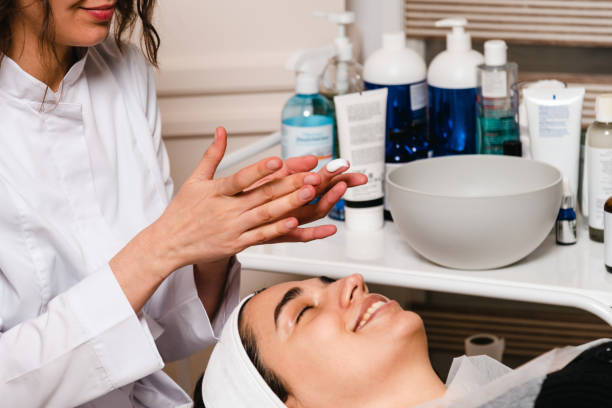Skincare tips and tricks summed up:
Cleaning is Fundamental. The fundamental thing for having healthy skin is having a clean face. Clean your skin in the mornings and at nights, getting rid of dirt and oil that may block pores and impurities. A good cleaning product or a gentle noncomedogenic cleanser appropriate for one’s skin type is suitable to avoid stripping off the skin of its natural moisture.
Close-up woman using moisturizer. Cream or body lotion on female hand in bathroom towel background, indoors. Daily skincare routine, top view

Moisturize, Even if You’re Oily
No skin is exempt from moisturizing, including oily or acne-prone skin. Find an oil-free, lightweight moisturizer in order to keep your skin hydrated and balanced. Hydrated skin heals better, and most importantly, moisturizer helps the skin maintain its barrier against environmental damage.

Sunscreen is Non-Negotiable
Sunscreen is one of the most critical steps in your skincare routine. However, exfoliating too much leads to negative changes in the skin. Depending on whether your skin is more or less sensitive, use a chemical exfoliant like AHA or BHA once or twice a week to avoid irritation but still encourage cell turnover.
Hydration is Key
It’s just as important as what you put on the skin. Hydration by drinking water helps to keep your skin hydrated, further improving elasticity to give your complexion a healthy and glowing look. At least 8 glasses of water per day will keep your skin looking and feeling its best.
Target Specific Concerns with Serums
Serums are concentrated formulas with active ingredients in higher concentrations to address specific skin concerns, ranging from acne and pigmentation to fine lines. Vitamin C is one of the major ingredients for brightening, while its counterpart, vitamin A derivative retinol, is a very strong anti-aging active; niacinamide reduces redness and blemishes.

Get Enough Sleep
Your skin repairs itself when you’re sleeping; so, it is advisable to sleep for 7-9 hours each night. In case you don’t get enough sleep, it will make your face look dull and puffy and may cause circles under your eyes. Rest assured, your skin is glowing and fresh after your body is well-rested, which is the reason they also call it “beauty sleep”.
Eat Skin-Friendly Foods
A diet rich in antioxidants, vitamins, and healthy fats can work on your skin’s behalf. Berries, leafy greens, and fatty fish are foods that combat free radicals, hydrate your skin, and reduce inflammation, among many more health benefits. Keep sugar intake at a minimum and stay away from those heavily processed foods as much as possible for avoiding breakouts.
Reduce Stress for Healthy Skin
Stress acts as a catalyst, leading to hormonal changes at times that can cause skin problems like acne and eczema. Try yoga or meditation, or perhaps stick to your routine exercise. These can help keep your skin clear and calm. So many times, a calm mind leads directly to clearer, healthier skin.
Consistency is Key
Long-term results are what matter, and for that, consistency in regular skincare is somewhat important. Skincare doesn’t give instant results; it requires consistency to have improvement for a longer period. So, one should religiously continue the skincare method with a particular skin type and be assured of getting a clear, glowing complexion after some time.
FAQs
1. How often should I wash my face to prevent zit?
You should wash your face twice a day—once in the morning and once before bed. Over-washing can irritate the skin and lead to more breakouts.
2. What ingredients should I look for in acne treatments?
Key ingredients for fighting acne include salicylic acid, benzoyl peroxide, retinoids, and tea tree oil. These help unclog pores, reduce bacteria, and promote skin renewal.
3. Is moisturizing important for acne-prone skin?
Yes, even acne-prone skin needs moisture. Use a lightweight, oil-free moisturizer to keep your skin hydrated without clogging pores.
4. Can I pop my zits?
It’s best to avoid popping zits, as it can lead to scarring, infections, and more inflammation. If you must, do it gently with clean hands or sterile tools.
5. What are pimple patches, and do they work?
Pimple patches are small adhesive dots that absorb pus and protect zits from bacteria. They can help reduce the size and redness of pimples, speeding up healing.
6. How can I prevent new zits from forming?
Stick to a regular skincare routine that includes gentle cleansing, exfoliating, and using acne-fighting ingredients. Also, avoid touching your face and change pillowcases regularly.
7. What should I eat to reduce acne?
A balanced diet rich in fruits, vegetables, and whole grains can help your skin. Avoid excessive sugar and processed foods, which may trigger breakouts.
8. Does stress cause zits?
Yes, stress can lead to hormonal changes that cause acne. Managing stress through exercise, meditation, or relaxation techniques can help reduce breakouts.
9. How long does it take for acne treatments to work?
Most acne treatments take 4 to 6 weeks to show noticeable results. Consistency is key, so stick to your routine and be patient.
10. When should I see a dermatologist for acne?
If over-the-counter treatments aren’t working after several weeks, or if you have severe or cystic acne, it’s a good idea to see a dermatologist for professional advice and prescription treatments.



